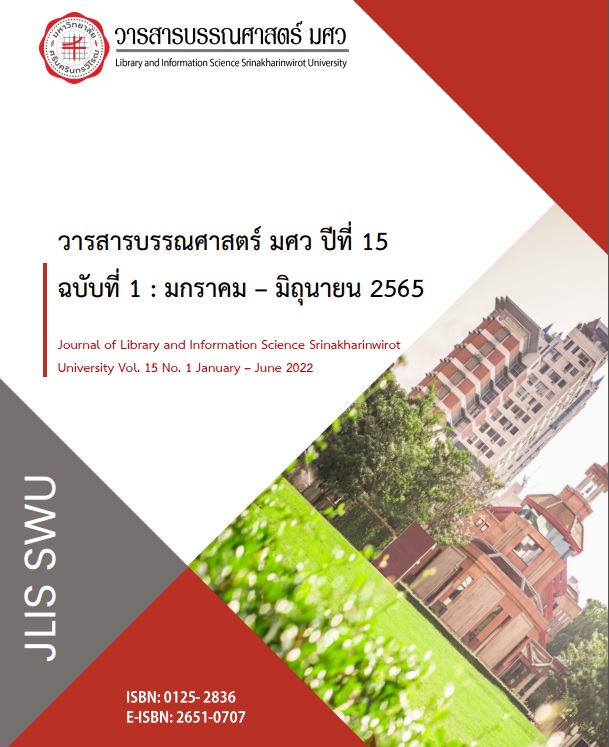The Design of Vocabulary Exercises from a Synthesis of the Classroom-based Research
Keywords:
Keywords: Classroom-based Research, Narrative Synthesis, Vocabulary ExercisesAbstract
Abstract
A synthesis of the research entitled “The Design of Vocabulary Exercises from a Synthesis of the Classroom-based Research” aimed to synthesize the classroom-based research on using and developing vocabulary exercises in terms of teaching materials development for vocabulary exercises to be designed. The resources are the three classroom-based studies of the researcher. The research instrument was a qualitative synthesis collected by means of 1) studying and analyzing the classroom-based research to select for a synthesis, 2) categorizing the studies which are the same purpose, 3) analyzing the contents in the studies to categorize the same contents, and 4) presenting the results of this qualitative synthesis. These qualitative data were analyzed by conducting narrative synthesis with content analysis. The findings of the synthesis revealed that:
1) the vocabulary exercises should be vocabulary games, for example, crossword puzzles and word search.
2) a variety of vocabulary exercises can solve the students’ problem of inability to remember the words.
3) the vocabulary exercises should be designed as matching the appropriate meaning (Th.) for each word so that technical terms in other fields can be applied in this kind of vocabulary exercises.
4) the vocabulary exercises of writing one sentence for each of the following words cannot solve the students’ problem of inability to understand the words because the students cannot write English correctly. For this reason, this type of vocabulary exercises should be removed.
Keywords: Classroom-based Research, Narrative Synthesis, Vocabulary Exercises
References
เอกสารอ้างอิง
Broukal, M. (2015). Weaving it together 3. Bangkok: Thai Watana Panich Co. Ltd.
BU Blogs. (2015). Vocab. # 3 Core Mid C Weaving It Together 3, 3rd ed., “An American Holiday – Hawaiian
Style”. Retrieved from http://blogs.bu.edu/gferrick/files/2015/02/MidC3.doc.
Cooper, H. & Lindsay, J. J. (1997). Research Synthesis and Meta-Analysis. In Bickman, L. & Rog, D.J. (eds.),
Handbook of Applied Social Research Methods, California: Sage Foundation. pp. 315-337.
Crossword Puzzle Maker. (2017). Living a Life without Chemicals. Retrieved October 15, 2017, from
https://www.puzzle-maker.com/crossword FreePuzzle.cgi.
Jamaramarn, U. (1988). Synthesis of research: quantitative. Bangkok: Publisher of Chulalongkorn University.
(In Thai)
Jamaramarn, U. (1998). Action research. Bangkok: Funny Publishing Ltd. (In Thai)
Jamaramarn, U. (2001). Classroom-based and school-based research for student development. Bangkok:
Funny Publishing Ltd. (In Thai)
Jamaramarn, U. (2004). The methods of a classroom-based research synthesis. Bangkok: Funny Publishing
Ltd. (In Thai)
Kenaphoom, S. (2021). Guidelines and techniques for writing the academic papers [Research report:
research article: academic article: textbook]. Bangkok: Chulalongkorn University Press. (In Thai)
Lane, J. & Lange, E. (1999). Writing clearly an edition guide (2nd ed.). Boston: Heinle & Heinle Publishers.
Office of the Basic Education Commission. (2008). Basic Education Core Curriculum B.E. 2551 (A.D. 2008).
Bangkok: Ministry of Education. (In Thai)
Pookcharoen, S. (2021). Word Building. Bangkok: Samlada Printing House. (In Thai)
Rujanawech, G. (2018). Fully smart English in one book by Dr. Gordon. Bangkok: Se-Education. (In Thai)
Santos, M. D., & O’Sullivan, J. K. (2010). MegaGoal student book 5. Bangkok: Thai Watana Panich Co. Ltd.
Schmitt, N. (2010). Researching vocabulary: a vocabulary research manual. New York: Palgrave Macmillan.
Sophitthammakun, T. (2018a). A synthesis of the results of the classroom-based research for unit design
from solving Matthayomsuksa 5 students’ problems and develop them. Proceedings of the 8th PIM
National Conference (pp. 88-102). Nonthaburi: Panyapiwat Institute of Management.
Sophitthammakun, T. (2018b). Using the vocabulary exercises for solving the students’ problem of Inability
to remember the words and surveying the students’ opinions with the vocabulary exercises.
Proceedings of the 8th PIM National Conference (pp. 103-116). Nonthaburi: Panyapiwat Institute of
Management.
Sophitthammakun, T. (2019). PWS Students’ need analysis for a lesson design in STAR STEMS “A CHEMICAL
FREE LIFE”. Journal of Kasetsart Educational Review, 34(1), 31-38.
Sophitthammakun, T. (2021). The design of exercises on word choices of Matthayomsuksa VI students from
an analysis of word choice errors. Journal of Kasetsart Educational Review, 36(1), 1-15.
Subcommittee on the Propulsion of Learning System Reforms in the Commission for Learning System
Reforms in the Education Reform Commission for Education Reform Council. (2017). Guidelines for
the use of the model of cultivating “Good citizenship, dominant discipline”: Good people with
discipline, love and pride in the nation, ability to master the aptitude, and responsibility for family,
community, society and nation with learning management according to the concept of “STAR
STEMS”. Nonthaburi: P. & P. Printing Prepress. (In Thai)
Wiratchai, N. (1999). Meta-analysis. Bangkok: Faculty of Education, Chulalongkorn University. (In Thai)
Wongwanit, S. (2002a). A synthesis of needs assessment techniques used in students’ theses of Faculty of
Education, Chulalongkorn University. Journal of Research Methodology: JRM, 15(2): May-August 2002
page 255-277. (In Thai)
Wongwanit, S. (2002b). Tips for doing the classroom research. Bangkok: Thai typewriter. (In Thai)
Wongwanit, S. (2010). Classroom action research (14th ed.). Bangkok: Chulalongkorn University Press. (In Thai)
Additional Files
Published
Issue
Section
License
Copyright (c) 2022 Faculty of Humanities, Srinakharinwirot University

This work is licensed under a Creative Commons Attribution-NonCommercial-NoDerivatives 4.0 International License.
Copyright Notice
Copyright of articles in the journal of Journal of Library and Information Science Srinakharinwirot University is the author's and the Faculty of Humanities, Srinakharinwirot University. All articles submitted for publication will be assessed by a group of distinguished reviewers. The Faculty of Humanities, Srinakharinwirot University and the editorial board claim no responsibility for the contents or views expressed by the authors of Individual articles. Copying is allowed freely, provided acknowledgement is made thereof, and within the scope of copyright law.



